
According to a press release, a first-in-man feasibility study focusing on a novel use of the RenalGuard system to manage fluids during diuretic therapy in congestive heart failure patients suffering from fluid overload has shown positive results for the system. A previous meta-analysis found that the system reduces all-cause mortality in patients undergoing cardiac interventions.
Piotr Ponikowski (Wroclaw Medical University, Poland) and Felix Mahfoud (Saarland University Hospital, Homburg, Germany) presented the results at the annual Devices for Heart Failure meeting(D-HF; 15–16 December, Berlin, Germany). The press release notes that Ponikowski and Mahfoud also identified the drawbacks of diuretic therapy—the cornerstone therapy for fluid overload, which acts primarily by inducing fluid loss—as their presentation reviewed the ways in which current treatment strategies for hospitalised patients with heart failure remain inadequate.
Originally developed for the treatment of contrast-induced acute kidney injury, the press release notes, RenalGuard therapy is designed to offer a potential solution to improve the impact of diuretic therapy in the treatment of fluid overload in heart failure patients. The results presented at D-HF followed the treatment of 10 diuretic-resistant patients with heart failure symptoms receiving diuretic therapy while their fluid management was controlled by the RenalGuard system.
Ponikowski comments: “None of the patients we treated experienced a fluid loss rate greater than the settings we established. RenalGuard Therapy is remarkably simple and safe, and works automatically to carefully achieve and control the desired fluid balance.”
The RenalGuard system measures the patient’s urine output, then infuses a volume of saline to maintain the desired fluid balance. The clinician can set a maximum fluid loss rate, beyond which RenalGuard will not allow the patient’s fluid balance to drop, thus limiting the potential of excessive fluid loss. This may allow clinicians to increase the dose of diuretic without increasing the risk of diuretic resistance.
“There is a clear unmet clinical need for alternative methods of fluid removal with superior efficacy in patients with heart failure. This first-in-man study demonstrated that RenalGuard can safely be used in these patients while maintaining the proper conditions to both prevent diuretic resistance, and increase the removal of excess fluid from the patient. Our initial experience with the RenalGuard system in heart failure patients is very promising, and we look forward to advancing our understanding of the benefits of this therapy to patients at risk,” says Mahfound.
The RenalGuard system is CE-marked and commercially available in Europe. A pivotal study is underway in the USA to support a planned premarket approval filing with the US FDA in 2018 for the prevention of contrast-induced acute kidney injury.








